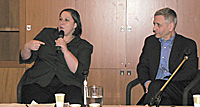By Leyna Krow, Assistant Editor, JTNews
American Jews hold a wide variety of opinions on Israel. There are those who support the nation unconditionally, those who believe the Jewish State should never have been created to begin with, and a likely majority that holds all manner of beliefs in between. But what leads us to form such beliefs?
On Feb. 21 at Hillel at the University of Washington, Rabbi Yohanna Kinberg and author Mark Braverman took part in a panel discussion that began with questions about what informs Jewish views on Israel, but also dipped unexpectedly into ruminations about the cultural isolation of the Jewish people, and whether Jews might have been better off in the long run as Christians.
Kinberg is the associate rabbi and education director of Temple B’nai Torah in Bellevue. Braverman is the executive director of the Holy Land Peace Project and the author of the book Fatal Embrace, about the relationship between Christians and Jews in Israel in the context of the Israeli-Palestinian conflict. The discussion was called “The Israeli-Palestinian Conflict, Jewish Spirituality, Tradition and Psychology,” and was hosted by the Kadima Reconstructionist Community.
Kadima board president Doug Brown introduced the afternoon’s topic, saying that for all the attention American Jews pay to Israel, they rarely take time to reflect on how they came to hold the beliefs that they do, or what those beliefs — specifically those that allow for the victimization of the Palestinians — mean about Jewish culture.
“These are questions we’d like to be absolved of having to discuss,” he said.
Both Braverman and Kinberg began by acknowledging that their personal views on Israel are based upon the experiences they have had in Israel coupled with reactions to their upbringings.
Braverman, who was raised on the East Coast in a Chassidic family and has relatives living in Israel, held the State of Israel in very high regard until visiting the country as a teenager and witnessing Israeli racism toward Arabs. Subsequent visits, to live on a kibbutz and then to do social justice work in the West Bank, led to a radical shift in his thinking.
“I had always thought I was pretty far to the left in my view on Israel,” he said. “Then I went to work in the West Bank and found I had actually been just right of center.”
Today, Braverman said, he has come to think of the creation of the Jewish State as a mistake, claiming it can never be a truly democratic country if the basic tenets prize the rights of one group of people over another.
Kinberg described her own feelings about Israel as closely tied to the liberal political climate in which she grew up. The trouble came for her when she tried to align what she saw going on in Israel with ideas she had always perceived as central to her Jewish faith, such as equality and social justice.
“Turns out what I thought was Judaism was my left-wing worldview from Eugene, Oregon,” she said.
She said that for her, sorting out where that distinction lies will be a life-long challenge.
Braverman then ventured into less steady territory — musing about what accounts for the opinions of the Jewish people as a whole when it comes to Israel. He took aim at Israel supporters, speculating as to how Jews can allow human rights abuse against Palestinians to take place in the name of nationalism and national safety.
“What is it about us?” he asked. “The idea of the abused becoming the abuser isn’t enough.”
Braverman suggested that injustice in Israel is the result of something larger than the Holocaust, or the challenges Jews living in the Palestinian Mandate faced prior to 1948. Rather, he said, it is centuries of isolation and ghettoization that has led to Israel’s inability to find a place in its society for Palestinians.
“We see ourselves as a people apart. That’s the problem. And the evidence of that problem is the dark side of Israel,” he said.
During a question and answer session, Rob Jacobs, executive director of Israel advocacy group StandWithUs Northwest, asked Braverman to elaborate on the notion of Jews as “a people apart.” Jacobs referenced a statement he said Braverman had made the day before at a conference at St. Mark’s Cathedral in Seattle, hosted by Friends of Sabeel, intimating that the Jewish people’s alienation started almost 2,000 years ago when they refused to accept Jesus as the messiah.
“I haven’t converted to Christianity,” Braverman assured the audience. “But Jesus is a very powerful figure to me…. And I wonder, what if Judaism had been able to make that shift? It would have put an end to our isolation and it might not have ended with us thinking we needed to go and create a Jewish homeland.”
Amid whispers from audience members in the back rows, Kinberg defended the decision of the world’s Jews not to become Christians.
“Hell yeah, it would have been a lot easier for us if we had all become followers of Jesus,” she said. “There might have been a lot less persecution. But we might also have ceased to exist.”
With regard to Braverman’s suggestion that the Middle East would have been better off had the Jewish State never been created, Kinberg noted that statements of hindsight do little to solve current problems.
“When a couple comes to me having marital problems, I don’t question if the institution of marriage was a good idea for them in the first place,” she said. “The thing for me is to offer a compassionate response for the people in front of me now.”
What the compassionate response may be to the Israeli-Palestinian conflict, Kinberg did not say, except to suggest that sometimes pragmatism is the most compassionate place to begin.
